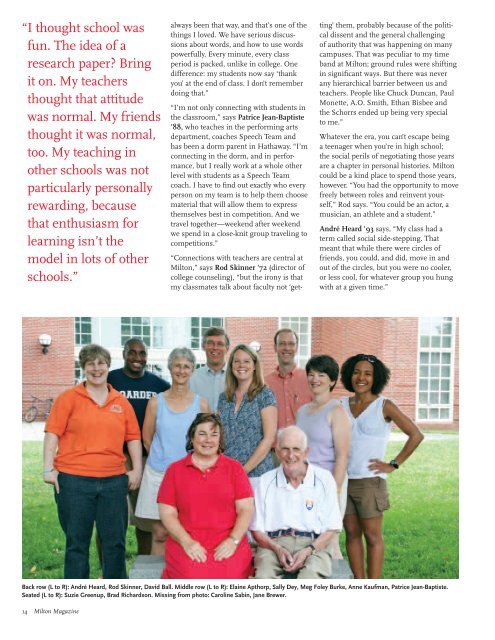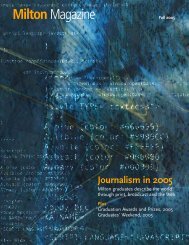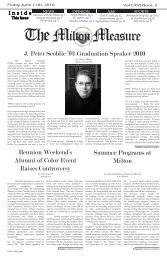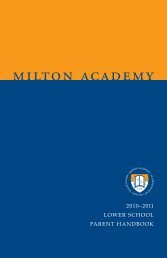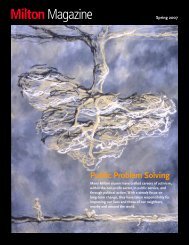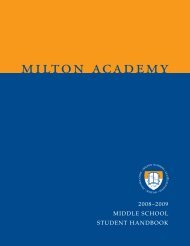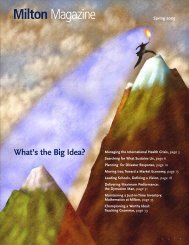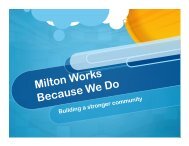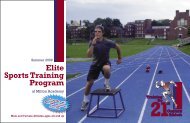“ I thought school wasfun. The idea of aresearch paper? Bringit on. My teachersthought that attitudewas normal. My friendsthought it was normal,too. My teaching inother schools was notparticularly personallyrewarding, becausethat enthusiasm forlearning isn’t themodel in lots of otherschools.”always been that way, and that’s one of thethings I loved. We have serious discussionsabout words, and how to use wordspowerfully. Every minute, every classperiod is packed, unlike in college. Onedifference: my students now say ‘thankyou’ at the end of class. I don’t rememberdoing that.”“I’m not only connecting with students inthe classroom,” says Patrice Jean-Baptiste’88, who teaches in the performing artsdepartment, coaches Speech Team andhas been a dorm parent in Hathaway. “I’mconnecting in the dorm, and in performance,but I really work at a whole otherlevel with students as a Speech Teamcoach. I have to find out exactly who everyperson on my team is to help them choosematerial that will allow them to expressthemselves best in competition. And wetravel together—weekend after weekendwe spend in a close-knit group traveling tocompetitions.”“Connections with teachers are central at<strong>Milton</strong>,” says Rod Skinner ’72 (director ofcollege counseling), “but the irony is thatmy classmates talk about faculty not ‘getting’them, probably because of the politicaldissent and the general challengingof authority that was happening on manycampuses. That was peculiar to my timeband at <strong>Milton</strong>; ground rules were shiftingin significant ways. But there was neverany hierarchical barrier between us andteachers. People like Chuck Duncan, PaulMonette, A.O. Smith, Ethan Bisbee andthe Schorrs ended up being very specialto me.”Whatever the era, you can’t escape beinga teenager when you’re in high school;the social perils of negotiating those yearsare a chapter in personal histories. <strong>Milton</strong>could be a kind place to spend those years,however. “You had the opportunity to movefreely between roles and reinvent yourself,”Rod says. “You could be an actor, amusician, an athlete and a student.”André Heard ’93 says, “My class had aterm called social side-stepping. Thatmeant that while there were circles offriends, you could, and did, move in andout of the circles, but you were no cooler,or less cool, for whatever group you hungwith at a given time.”Back row (L to R): André Heard, Rod Skinner, David Ball. Middle row (L to R): Elaine Apthorp, Sally Dey, Meg Foley Burke, Anne Kaufman, Patrice Jean-Baptiste.Seated (L to R): Suzie Greenup, Brad Richardson. Missing from photo: Caroline Sabin, Jane Brewer.14 <strong>Milton</strong> <strong>Magazine</strong>
“I was impressed when I came that at<strong>Milton</strong>, everybody was special,” Elainesays. “And we still have so many wonderfullyquirky students who aren’t ostracizedfor being unique but celebrated for whatthey contribute to the mix. There are artistsand jocks and techno geeks and Speechies,and they blend. In my dorm [Goodwin] acouple years back, it was the football playerwho led the cheer to congratulate the chessplayer’s big win. Any musician is instantlyaccorded a certain respect. Coolness at<strong>Milton</strong> can be acquired in lots of ways.”Caroline feels that people who are verbal,as in “not afraid of healthy debate” and“comfortable with expressing themselves,”thrive at <strong>Milton</strong>. “We seem to breedsocial activists,” says Suzie Greenup ’75,“students who question everything.” Allagree that a sense of humor persists here:<strong>Milton</strong>ians are serious students who don’ttake themselves overly seriously.The mix of boarding, day and Boston isstill, also, the recipe for a unique Schoolculture. <strong>Milton</strong> is urban, and studentsunfailingly mention Boston’s proximityas a plus. Day families still embrace theirchildren’s boarding friends. Perhaps morethan ever, day parents bring their diverseprofessions in metro Boston to campus,guaranteeing <strong>Milton</strong>’s connection withthe world. On the other hand, with avigorous dorm culture, students from allover the world, and a very active campus,<strong>Milton</strong> is the place where you meet incrediblefriends, and you can count on beingwith them, having fun, after class and onweekends.Students “Dare to be true.”“Sometimes we think that ‘Dare to be true’means be true to yourself and who you are,do what feels good to you and resist anythingthat challenges you to do things differently,”Elaine says, “but to me, it meansto live with integrity: dare not only to speakthe truth, but to reflect on and accept theconsequences of your beliefs and youractions.”What’s different?“When I came for my interview to work at<strong>Milton</strong>, I was struck by a tall, black malewalking confidently and easily across thequad, hanging out with three or four studentsof different ethnicities,” says Patrice.“Students of color today feel free to bewho they are, and we found it hard to dothe same in the ’80s.” Not only are “thedemographics different,” as Elaine says,but <strong>Milton</strong> is truly involved on all issues ofdifferences among people.“I think the mix at <strong>Milton</strong> today is terrific,”says Brad. “We weren’t the diverseschool—we weren’t the national school—that we are today. We weren’t differentracially, or in terms of religion, or socioeconomically.I think of it as something Ireally missed out on.”“For me to come back, the demographicshad to be different,” says Rod. “Before, notmany students even had experience livingoutside of New England. Students todayhave a much broader awareness of and tolerancefor difference.” <strong>Milton</strong> tries hard toask the questions, explore the values, andhold the discussions that will prepare studentswell for their world. “<strong>Milton</strong> makesyou feel uncomfortable in a good way,”says Jane Brewer ’62. “That is, you cannever be complacent.”<strong>Milton</strong> <strong>Magazine</strong> 15


